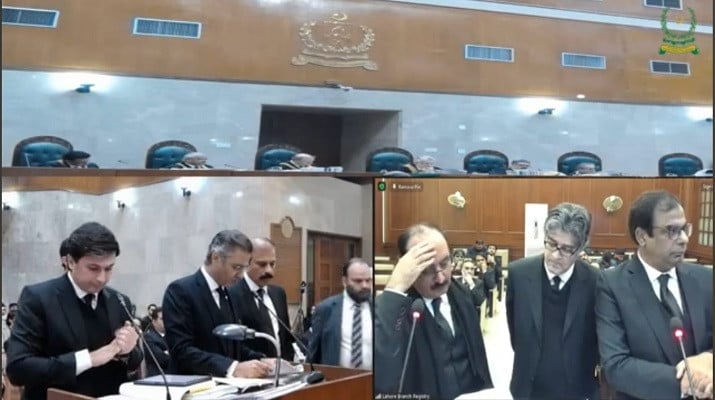ISLAMABAD: With the next general elections just over a month away, Chief Justice of Pakistan (CJP) Qazi Faez Isa said on Tuesday that the Supreme Court (SC) wants to end proceedings quickly on the lifetime disqualification issue so that returning officers (ROs) don’t have to worry.

In a session of the seven-member bigger bench—which comprised Justices Syed Mansoor Ali Shah, Yahya Afridi, Aminuddin Khan, Jamal Khan Mandokhail, Muhammad Ali Mazhar, and Musarrat Hilali—the CJP made these remarks.
During the live-streamed session on the Supreme Court’s website, Pakistan’s Attorney General (AGP) Mansoor Usman Awan asked the court to reconsider the legislation because of “certain contradictions” in Samiullah Baloch’s earlier ruling.
The AGP asked the court to reconsider its previous decision on Nawaz’s lifetime ban, citing a Supreme Court order from December 11, 2023, even though they supported the amendment reducing the disqualification period to five years.
Sanaullah Baloch, an advocate, and Usman Karim were among the respondents who answered “yes” when the CJP asked about their support for lifetime disqualification during the hearings.
On the other hand, Saqib Jillani, the lawyer for Mir Badshah Hussain Qaiserani, whose petition the matter of disqualification came up last month, disagreed with it and sided with the AGP. According to Jillani, he fully endorses the current federal legislation.
After that, CJP Isa cast doubt on the position of the provincial advocate generals, who had previously signaled their backing for the AGP’s case. At the time of nomination papers submission, the AGP read out Articles 62 and 63 of the Constitution, stressing their relevance.
The CJP noted that whereas certain requirements were simple, others, such those pertaining to character, were more difficult to meet. Having a solid understanding of Islam is also required. The ability of any individual to succeed on this exam is questionable, he continued.
The courts have filled the gap left by the Constitution, he pointed out, as it does not specify the duration of disqualification.
In his dissenting opinion, Justice Shah questioned the relative weight of the Constitutional and Elections Act periods. In particular, he brought attention to the reading of Article 63 that would permit election participation after a specific amount of time for heinous crimes like treason and murder but would permanently disqualify someone for less significant offenses.
CJP Isa said that the revision to the Elections Act could be implemented since it had not been disputed. The possibility that this would be seen as legislation superseding the Supreme Court’s decision was something that Awan was worried about.
Differences between Articles 62 and 63 were discussed in depth, with CJP Isa bringing attention to the difficulty of judging someone’s character. He brought attention to the fact that Article 62 did not specify a disqualification period, an issue that the court had already resolved.
As long as there were court rulings, the AGP maintained, the lifetime disqualification pronouncement remained in effect. Recognizing that people are fallible, the CJP stressed the importance of forgiveness.
Among the many topics covered during the hearing were inquiries on the personalities of historical people and the 1985 amendments to Article 62.
There were hints that the case would be resolved in the next sessions, thus the hearing was postponed until January 4.
After the hearing, the Chief Justice Palmer announced that the Supreme Court wanted to wrap up the case on January 11, highlighting the court’s emphasis on the matter’s legitimacy and constitutionality.
Given the discrepancy between legislative intent and court precedent on the subject of how long a legislator’s disqualification should last under Article 62(1)f, the highest court in the land has decided to step in and decide whether the lifetime or five-year disqualification is more appropriate.
The problem with disqualification arose when former military dictator Gen Ziaul Haq added Article 62(1)f to the Constitution through the 8th Amendment. No democratically elected administration in the 38 years since its incorporation has succeeded in repealing this provision of the Constitution.
When a larger Supreme Court bench disqualified former prime minister Nawaz Sharif under Article 62(1)(f) in the Panama Papers case, the matter became prominent. A later bench upheld the court’s ruling that the disqualification would be permanent.
The disqualification period was increased to five years under Article 62(1)(f) in June of last year when parliament amended Section 232 of the Election Act. Now when the Supreme Court is about to decipher the situation, this legislative action further complicates it.
At the same time, the head of the National Accountability Bureau (NAB) petitioned the Islamabad High Court (IHC) to reinstate the convicted person’s 10-year disqualification from participating in the upcoming general elections.
The National Anti-Corruption Bureau (NAB) appealed the court’s decision to reduce the disqualification period to five years in an intra-court appeal.









































